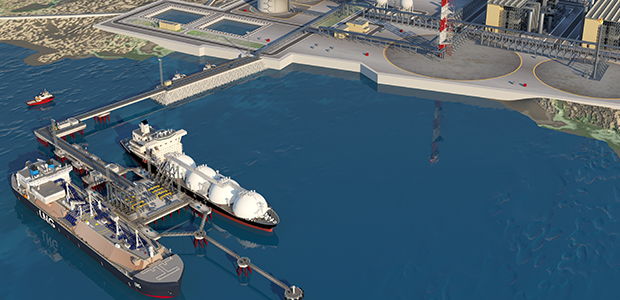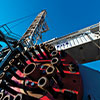
LNG Pause Rests Atop Deficient Science, Analysis Shows
When the Biden administration said earlier this year that the U.S. Department of Energy would pause additional liquefied natural gas export permits as it examined those authorizations’ alignment with the public interest, it justified the move with questionable claims, the American Petroleum Institute indicates. Moreover, the group says, additional research continues to reveal cracks in that rationale’s foundation.
In July, U.S. District Court for the Western District of Louisiana issued a preliminary injunction against the pause. However, the Biden administration is appealing that decision.
The latest entity to take issue with the pause’s rationale is not an oil and gas group, nor a libertarian or conservative think tank, but the Breakthrough Institute, API says. The institute, which counts Bill Gates among its benefactors, describes itself as a global research center that identifies and promotes technological solutions to environmental and human development challenges. It expresses confidence that “technological innovation, particularly in energy and agriculture, can enable us to both meet human needs and reduce our reliance on natural resources.”
In a new report, titled “A Major Paper on Liquified Natural Gas Emissions Is Riddled with Errors,” API says the Breakthrough Institute identifies essential flaws with the methodology and academic fitness of research on which the Biden administration based its permitting pause. “Research from Cornell University professor Robert Howarth is seen as the technical basis for the freeze,” API relates. “In the new report, the Breakthrough Institute found flaws across Howarth’s analysis of the lifecycle emissions of U.S. LNG.”
Why Exports Matter
U.S.-produced hydrocarbons’ essential contribution to the country’s wellbeing includes their status as a foreign policy tool, API emphasizes, which appears particularly true amid the world’s conflicts.
“It is critical to restore the role of American energy in bolstering our geopolitical strength as wars rage in two of the world’s energy-producing regions,” the group says. “As part of our Five-Point Policy Roadmap, API supports fully and immediately lifting the administration’s LNG permitting pause—a move that would follow guidance in a district court’s recent injunction. It’s past time to approve all pending export applications languishing at DOE. This would signal that the United States remains the world’s go-to supplier of LNG, displacing higher-emitting fuels and supplying reliable energy to allies.”
Ending the pause is all the more appropriate given the Breakthrough Institute’s evaluation of the claims by Howarth and activist Bill McKibben, who assert that U.S. LNG exports are “worse than coal” for Earth’s climate. The institute’s analysis suggests that allowing such claims to sway federal policy is deeply problematic.
“That an activist scholar with a history of contested and critiqued claims could influence the Biden administration with such an obviously erroneous study is more than concerning,” the Breakthrough Institute assesses. “It demonstrates how faulty science in the name of climate can derail important policy debates and make the global energy transition far harder.”
According to API, the Breakthrough Institute analysis offers highly specific criticisms of Howarth’s claims. “Breakthrough Institute experts detailed obvious weaknesses with Howarth’s scientific approach,” API describes. “It showed that his conclusions are based on inaccurate and exaggerated ‘life cycle assessments’ omitting recent data and peer-reviewed materials.”
- The errors the institute finds in Howarth’s analysis include:
- Inaccurate information about where exported natural gas is produced;
- Incorrect data on whether emissions occur in upstream or downstream operations;
- Incomplete or flawed data regarding emissions or leaks during the overseas re-gasification process;
- Mistaken LNG shipping distances; and
- Faulty and pessimistic assumptions about the capacity and size of LNG shipping tankers.
Relying on such shoddy scholarship to inform public policy not only damages U.S. geopolitical interests, API and the Breakthrough Institute say, but also can warp environmental policy in counterproductive ways.
“In the long run, policymakers around the world will need to weigh the environmental and energy policy benefits of using LNG instead of coal in their respective economies,” API reflects. “But restricting LNG supplies at their source in the United States—as the Biden administration is trying to do—does not translate into an effective decarbonization or climate strategy. In fact, the Breakthrough Institute notes the idea of LNG benefits is ‘empirical and straightforward.’”
The bottom line, API concludes, is that bad methodology should not hinder LNG progress and U.S. energy leadership. The Breakthrough Institute concurs, API notes. “When it comes to the carbon footprint of LNG,” the report says, “climate commentators have allowed flawed methodology to dominate the conversation for too long.
“Howarth’s study (is) no basis upon which to make energy policy, and the Biden administration would do well to refer to higher-quality studies in the literature and experts at the DOE in developing a sound LNG export policy,” it adds.
API’s post about the Breakthrough Report can be found at Report Undermines Justification for President Biden’s LNG Pause.
For other great articles about exploration, drilling, completions and production, subscribe to The American Oil & Gas Reporter and bookmark www.aogr.com.






